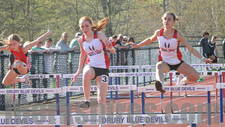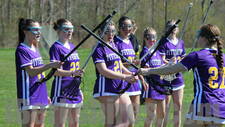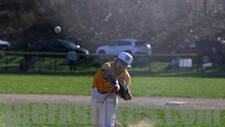Friday Health Focus: Fatter Than EverBy Susan Bush
12:00AM / Thursday, March 30, 2006
 | | Ron Hansen, REACH Community Health Foundation fitness and nutrition director |
North Adams - There are tons of excuses, but probably just two reasons why the state's overweight and obese population has been reported on the rise.
"Obesity is because people don't eat right and don't exercise," said Ron Hansen, fitness and nutrition director of the REACH Community Health Foundation.
Obesity Up By 80 Percent
Last week, the state Department of Public Health released an annual Behavioral Risk Factor Surveillance System health risk factor tracking report for the year 2004. The report is based on telephone interviews with more than 8,200 state residents age 18 and older, and includes a focus on preventative behaviors, chronic health conditions, and public health issues.
Among the findings was the unhappy news that obesity among the state's adult population climbed from 10 percent in 1990 to 18 percent in 2004, an increase of 80 percent.
And 55 percent of the state's adult population reported being overweight.
According to an example given in the report, a 5'8'' tall person weighing 164 pounds is considered overweight and considered obese at a weight of 197 pounds.
Obesity and being overweight are costly conditions that impact state finances and may interfere with personal lives. During 2003, $1.8 billion dollars of state funds were spent on direct and indirect costs associated with obesity and "unhealthy body weights," according to the report.
Those with unhealthy body weights are at increased risk for high blood pressure, heart disease, diabetes, stroke, osteoarthritis, respiratory problems, and specific cancers.
Making Health Happen
In most cases, people can change their weight and their health if they are willing to make food choice changes and get their bodies moving, Hansen said. Change takes work, he said.
"These days, convenience rules the day," he said during a March 28 interview. "If it's not convenient to exercise, people don't do it."
Families must develop mechanisms to create convenience for exercise, Hansen said, and noted that one of the most highly recommended exercise strategies, walking, is inexpensive [ "All you need is a good pair of walking shoes."], can be done almost any time and anywhere, and is family-friendly.
"Swimming is also very good, especially for those who have arthritis or other issues," he said.
Meal planning and grocery shopping planning are key components to health eating, he said.
"People need to plan meals and people need to plan a [grocery]shopping trip," he said.
Smart Shopping, Smart Cooking
Canned or frozen vegetables are close nutritionally to fresh produce and are usually less expensive. Rinsing canned vegetables before cooking can reduce the amount of sodium, he said.
People living with tight food budgets can take advantage of coupons to make their food dollars stretch farther over healthier choices, he said.
How food is cooked is also important.
"Frying is not good," Hansen said. "Anything fried is not good, even if it's a vegetable."
New labeling regulations that force food companies to identify and specify contents and amounts are very helpful, Hansen said.
Reading labels can help consumers choose healthier foods, but consumers have to develop some savvy about what the label really means. Hansen explained that an item labeled "low sugar" may not be low in sugar content, but may be lower in sugar than another brand or version of the product.
"It may say 'low,' but it may mean 'low in proportion to,'" he said.
Size Wise
Portion size is another factor that influences weight, said Rich
Flores, a registered dietician working at the North Adams Regional Hospital. A good way to offer appropriate portions is to try to serve meat, starches, and vegetables in equal amounts. One way to accomplish that is to arrange the food similar to a peace symbol, which is almost equal thirds, he said.
"You can be realistic about serving size, as long as you are aware of what you are eating," he said. "A lot of times, a serving size of pasta is listed as a 1/2 cup. Most people eat more than a 1/2 cup of pasta. So have two cups of pasta, but realize that two cups of pasta amounts to four servings of starches. So two cups of pasta and a couple pieces of garlic bread is the recommended amount of starches for the day."
Most of the folks who seek help from Flores are "very sincere," he said.
"They really want to do something about [their health]," he said. "And those who don't want to do something about it are the ones who don't show up for their appointments."
Type 2 Diabetes Rising In Region
Flores said that he is concerned about an increase in youth diagnosed with Type 2 diabetes, once commonly referred to as "adult onset diabetes." Overweight and obese people are at greater risk for developing Type 2 diabetes.
"It was called 'adult onset' because we weren't becoming overweight until much later in life," Flores said. "In the past 24 months, I have seen about 10 people under age 20 with Type 2 diabetes. I've been here for five years, and when I first came here, I saw no persons under age 20 with Type 2 diabetes."
There is a genetic factor associated with the condition, Flores said.
"But Type 2 is generated by high intakes of extra calories," he said.
Losing weight before diabetes strikes is a preferred situation, and losing weight after a diagnosis is likely to produce health benefits.
"But if you keep gaining weight, it will make the diabetes worse," Flores said, and noted that Type 2 diabetes can affect kidney function, vision, and cause other adverse conditions.
Flores said another concern is the number of "borderline" Type 2 diabetes cases he's found among the region's youth.
"We Can Do Something About This"
With the condition occurring in a younger population, possible consequences may begin to occur in a younger population as well, he said.
Instead of facing kidney problems and even dialysis at age 65 or 70, those who are diagnosed with Type 2 diabetes while in their teens or 20s and fail to properly care for themselves may be facing serious health situations at age 40 or 45, he said.
"I really do emphasize that we can do something about this," he said, and stressed that the benefits of proper nutrition are evident to a person with diabetes immediately.
"Diabetes is something that you can actually control," he said. "You can see the results of your choices with each blood sugar level test."
Family Workouts Work
Families that work together toward healthier lifestyles have a better likelihood of success, Hansen said. A REACH Foundation "Families Making Changes" program is currently underway.
"We are trying to give the families strategies for change," Hansen said. "We look at their environment through a questionnaire, and we try to stick with simple strategies."
For example, if a family member wants to exercise after work, the strategy might be to keep a packed work-out bag in the car, rather than making a trip home after work to retrieve work-out items. Once a person travels home, they may become distracted with other things, such as a television program, and lose the motivation to exercise.
"You have to make it convenient for yourself," Hansen said. "You have to look at the factors in your life to make the appropriate changes."
Families must remove the "barriers" that are in the way of healthy eating and exercise, Hansen said. Television and computers are two major barriers to exercise, he said. Parental reluctance to allow their children to play outside unsupervised because of safety concerns is also taking a fitness toll.
Hansen offered suggestions.
"Build exercise into family time after work and on weekends. Make it a normal part of the day to go outside and take a walk, or go swimming."
The YMCA does offer financial assistance for memberships, he added.
A decline in neighborhood pick-up games of softball, football, and games like tag haven't just reduced physical activity but has eroded social contact as well.
"A decrease in spontaneous play has also reduced social interaction and opportunities for kids to learn problem solving skills," Hansen said. "Kids are supposed to get at least 60 minutes of exercise a day."
One Small Step After Another
Small changes are the best way to make big impacts, he noted. Passing up soft drinks and drinking water, switching from whole milk to one percent milk, and buying and serving nutrient dense foods can result in health benefits, he said.
"Don't overdo changes," he said. "Remember, it's not about never having a piece of cake or pie, it's about not having those things every day. There has to be balance, and lot of variety."
Flores said the best strategy includes realistic changes and expectations.
"If you are tired walking up a flight of stairs, we need to change that," he said. "It's about the day-to-day, about feeling better when you are doing day-to-day stuff. There are some things that can be easier if you lose 10 pounds. It's about making the changes that can make your life easier. It is not about trying to create bikini models or tri-athletes."
The 2004 Behavioral Risk Factor Surveillance System annual report may be viewed at a www.masschip.state.ma.us Internet Web site.
Susan Bush may be reached via e-mail at suebush@iberkshires.com or at 802-823-9367.
|



















